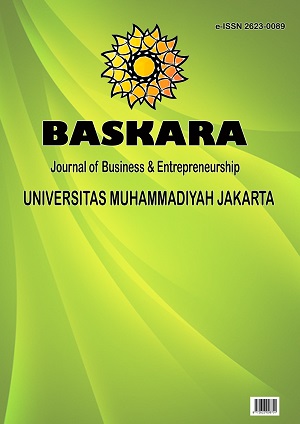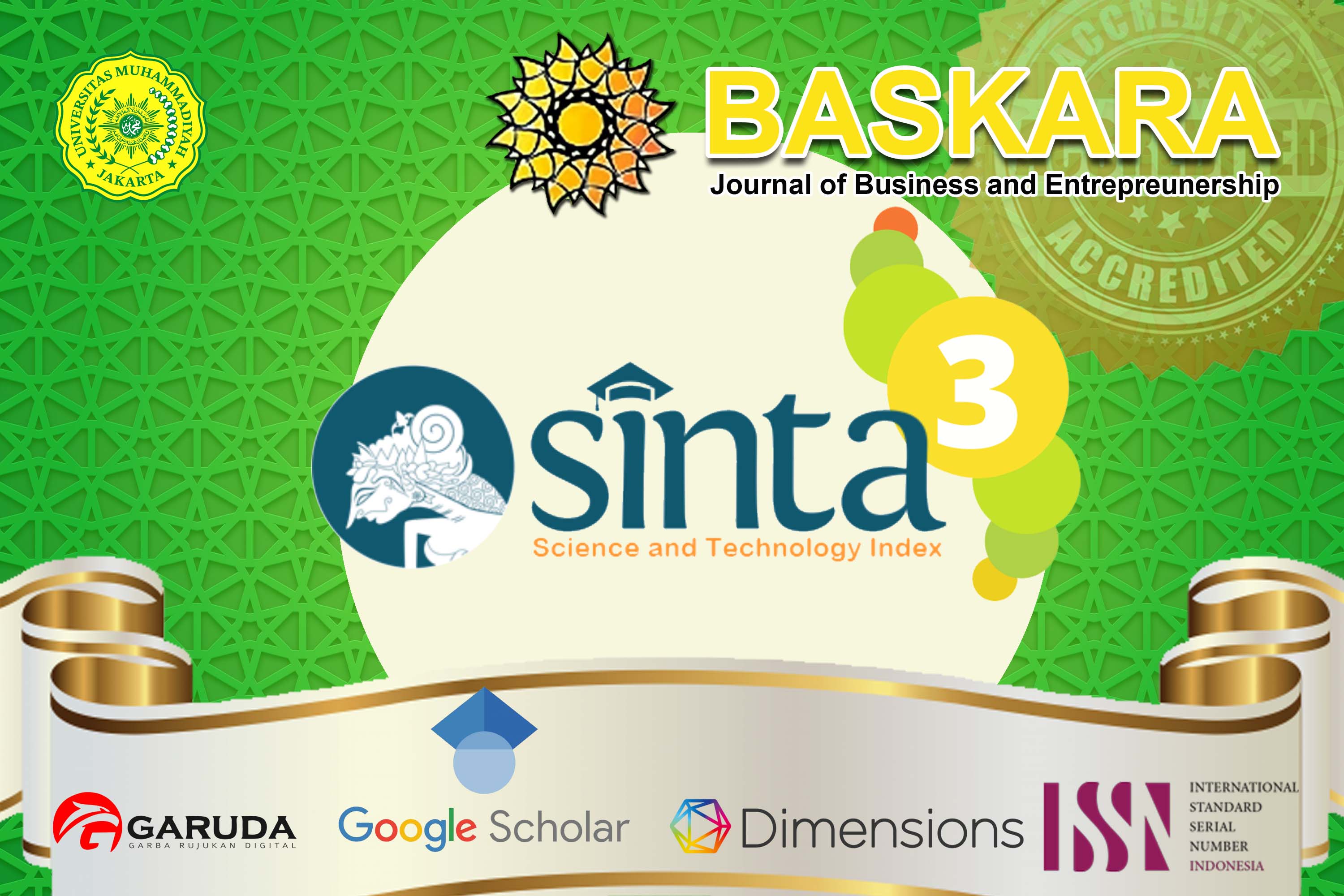Sukuk Linked Wakaf For MSME Develpoment
DOI:
https://doi.org/10.54268/baskara.v5i1.12190Keywords:
Sukuk, Waqf, CWLS, UMKMAbstract
The existing Sharia investment products are incorrect; the other is a state sukuk product. Aside from receiving returns on state sukuk, investors can also contribute to the country's development. Because the development of sukuk products is channeled to the actual sector, particularly for MSME (Micro, Small Maedium Enterprise) actors, Islamic financial institutions must play a role in carrying out the process of developing and aiding MSMEs. If many state sukuk products were previously allocated for infrastructure development, there needs to be an allocation for economic recovery through MSMEs under the current situations. The goal of this research is to assess the growth of state sukuk and the form of sukuk product development through state CWLS for the development of MSMEs. This is a qualitative study that examines the state sukuk market and the MSME sector. Secondary data was used, including information from the Ministry of Finance's Directorate General of Financing and Risk Management (DJPPR). The data analysis technique employed is descriptive qualitative, which depicts the evolution of state sukuk from 2019 to 2020, as well as forms of innovation for state sukuk goods designed specifically for MSMEs recovering from the covid-19 outbreak. PBS Auction Sukuk, PBS Private Placement Sukuk, SNI, SPN-S, Rite Sukuk (SR), and Savings Sukuk (ST) grew by 40.80% from 2019 to 2020, according to the findings of this study. Sukuk auctions at PBS increased by 39.59 percent, PBS Private Placement Sukuk increased by 214.39 percent, SR increased by 72.93 percent, and SNI Sukuk increased by 26.86 percent. In the meantime, SNI Sukuk fell by -30.01 percent, and ST fell by -35.76 percent. Providing business capital through Nazhir with a profit-sharing scheme, business assistance schemes, and maximizing the types of Waqf sukuk distributed to the productive sector are all schemes that can be implemented in developing MSMEs through the CWLS sukuk.References
Faudji, R., & Paul, W. (2020). Cash waqf linked sukuk dalam optimalkan pengelolaan wakaf
benda bergerak (uang). Jurnal Ilmiah MEA (Manajemen, Ekonomi, & Akuntansi), 4(2),
–348.
Rahman, M. I. F., Nurwahidin, N., & Adnan, N. (2021). Analisis Model Cash Waqf Linked Sukuk
(CWLS) Sebagai Instrumen Pembiayaan Pemulihan Dampak Pandemi Covid-19. Jurnal
Bimas Islam. https://doi.org/10.37302/jbi.v14i1.343
Rahmawati, M., & Tanjung, H. (2018). Analisis Sukuk Negara Sebagai Alternatif Pembiayaan
Anggaran Pendapatan Dan Belanja Negara. An-Nisbah: Jurnal Ekonomi Syariah, 5, 338–
Sari, N. R., Bulutoding, L., Aditya, R., & Jannah, R. (2020). Equity crowdfunding for SMEs: sharia
compliance challenge amid the covid-19 pandemic. Jurnal Iqtisaduna, 6(2), 198–213.
Snyder, H. (2019). Literature review as a research methodology: An overview and guidelines.
Journal of Business Research, 104, 333–339.
Wafa, M. A. K. (2010). ANALISA FAKTOR-FAKTOR YANG MEMPENGARUHI TINGKAT
PERMINTAAN SUKUK RITEL-I (Periode Maret 2009-Juni 2010). La_Riba.
https://doi.org/10.20885/lariba.vol4.iss2.art2
Wijaya, R. H. (2021). INVESTASI SYARIAH DAN PERTUMBUHAN EKONOMI: OPTIMASI PERAN
SUKUK SEBAGAI PENUNJANG PEMBANGUNAN EKONOMI NASIONAL. JURNAL EKONOMI
SYARIAH. https://doi.org/10.37058/jes.v6i1.2414
Yunita, P. (2020). Cash Waqf Linked Sukuk (CWLS) Model: For Indonesia Sustainable Food
Security. Al-Awqaf: Jurnal Wakaf Dan Ekonomi Islam, 13(1), 59–72.
Zaitun, Z., & Juliyanto, F. (2022). Covid 19 Pandemic: The Inspiration to Start Online Business.
BASKARA: Journal of Business and Entrepreneurship, 4(2), 18–27.
(https://www.kemenkeu.go.id/single-page/sukuk-wakaf/)
(https://www.bwi.go.id/4030/2019/11/20/mengenal-lebih-dekat-cash-wakaf-linked-sukuk/
Aditiya, R., Suwandi, M., Sari, N. R., & Fadhilatunisa, D. (2022). POTENSI SUKUK RITEL DAN
SUKUK TABUNGAN UNTUK MEMPERCEPAT PEMULIHAN EKONOMI PASCA PANDEMI
COVID-19. Equilibrium: Jurnal Penelitian Pendidikan Dan Ekonomi.
https://doi.org/10.25134/equi.v19i01.4282
Amalia, P., Irianti, E. D., Fiskal, K., Imron, M., Nasution, Z., & Hanifah, A. (2021). KAJIAN
KELOMPOK ANALIS SYARIAH Editor: Eri Hariyanto Jamil Abbas Tim Kajian. 1–34.
Anik, A., & Prastiwi, I. E. (2017). Pengembangan Instrumen Sukuk Dalam Medukung
Pembangunan Infratruktur. Jurnal Ilmiah Ekonomi Islam, 3(03), 173–180.
Ariyana, F. R., Arundina, T., & Kasri, R. A. (2020). Sukuk market liquidity determinants: a case
study on sovereign sukuk in Indonesia. Institutions and Economies, 66–90.
Ausat, A. M. A., & Suherlan, S. (2021). Obstacles and solutions of MSMEs in electronic
commerce during covid-19 pandemic: evidence from Indonesia. BASKARA: Journal of
Business and Entrepreneurship, 4(1), 11–19.
Baiti, E. N., & Syufaat, S. (2021). Cash Waqf Linked Sukuk Sebagai Instrumen Pemulihan
Ekonomi Nasional Akibat Covid-19. Jurnal Hukum Ekonomi Syariah, 4(1), 37–70.
DSN-MUI. (2020). FATWA DEWAN SYARIAH NASIONAL-MAJELIS ULAMA INDONESIA NO:
/DSN-MUIAX2020 Tentang SUKUK.
DSN-MUI. (2002). Fatwa Dewan Syari’ah Nasional Nomor: 32/DSN-MUI/IX/2002. Dewan
Syariah Nasional MUI.
DJPPR Kementerian Keuangan RI. (2019). Laporan Tahunan 2019.
DJPPR Kementerian Keuangan RI. (2019). Laporan Tahunan 2020.
Fatha Pringgar, R., & Sujatmiko, B. (2020). Penelitian Kepustakaan (Library Research) Modul
Pembelajaran Berbasis Augmented Reality pada Pembelajaran Siswa. Jurnal IT-EDU,
(01), 317–329
Downloads
Published
Issue
Section
License
In order for Baskara: Journal of Business and Entrepreneurship to publish and disseminate research articles, we need publishing rights (transfered from author(s) to publisher). This is determined by a publishing agreement between the Author(s) and Baskara Journal. This agreement deals with the transfer or license of the copyright of publishing to Baskara: Journal of Business and Entrepreneurship, while Authors still retain significant rights to use and share their own published articles. Baskara : Journal of Business and Entrepreneurship supports the need for authors to share, disseminate and maximize the impact of their research and these rights, in any databases.
As a journal Author, you have rights for a large range of uses of your article, including use by your employing institute or company. These Author rights can be exercised without the need to obtain specific permission. Authors publishing in Baskara : Journal of Business and Entrepreneurship have wide rights to use their works for teaching and scholarly purposes without needing to seek permission, including:
- use for classroom teaching by Author or Author's institution and presentation at a meeting or conference and distributing copies to attendees;
- use for internal training by author's company;
- distribution to colleagues for their reseearch use;
- use in a subsequent compilation of the author's works;
- inclusion in a thesis or dissertation;
- reuse of portions or extracts from the article in other works (with full acknowledgement of final article);
- preparation of derivative works (other than commercial purposes) (with full acknowledgement of final article);
- voluntary posting on open web sites operated by author or author’s institution for scholarly purposes.
Copyright Transfer Agreement for Publishing (Publishing Right)
The Authors who submit manuscript has to understand that if accepted for publication, mean that all copyright and publishing right of the article shall be assigned/transferred to Baskara: Journal of Business and Entrepreneurship as assigned publisher.
- CC BY-NC: This license allows reusers to distribute, remix, adapt, and build upon the material in any medium or format for noncommercial purposes only, and only so long as attribution is given to the creator.
It includes the following elements:
BY ![]() – Credit must be given to the creator
– Credit must be given to the creator
NC ![]() – Only noncommercial uses of the work are permitted
– Only noncommercial uses of the work are permitted
Baskara (C) Copyright (2022):
BASKARA: Journal of Business and Entrepreneurship by https://jurnal.umj.ac.id/index.php/baskara
is licensed under a Creative Commons Attribution-NonCommercial 4.0 International License








